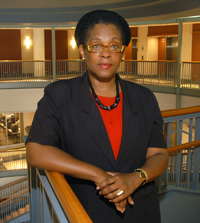Twila Perry is the first tenured woman of color and female African American professor on law faculty

Among the country’s leading scholars on issues of race and family law, Perry is widely recognized for her contributions to legal scholarship, including influential publications on the intersection of critical race theory, feminist legal theory, and family law. She is also lauded for her work on transracial adoption and child placement decisions. A member of the Rutgers law faculty for almost three decades, Perry teaches electives in family law, children and the law, and race, gender and tort Law. She is considered an effective advocate and leader on faculty diversity issues and a generous mentor to faculty, junior scholars, and students of color.
Perry, who is writing a book on gentrification in Harlem, discusses her career trajectory and scholarly interests .
Why did you decide to go to law school and become a law professor?
I was in graduate school for social work and discovered that my primary interest was in social policy. I felt I could be more effective as a lawyer than as a social worker. After practicing law for several years, I wanted the freedom to think, read, write, and speak about issues that I felt were important.
What inspired your scholarly interest in the role of race and gender in family law?
Family law is an area in which issues of race and gender intersect. I have always been interested in issues involving race, but attention to gender issues came after I entered the legal profession and understood the impact of gender on women’s professional opportunities. I began to think more deeply about the similarities and differences between issues of race and gender in people’s professional and private lives.
What are the most notable changes you have seen in this area of law in the past 25 years?
During the mid 1980s, students seemed uncomfortable discussing same-sex marriage. It was very rare for a student to speak in favor of it. Today, the majority of students in my classes seem to support same-sex marriage – indeed, it is rare for students to express opposition to it.
Your colleagues are effusive in their praise of your support of their scholarship and careers. What do you find rewarding about mentoring?
I am clear that the opportunities I have had were the result of efforts of many people – people I knew and people I will never know. You can never really pay back those who helped open doors for you, but you can help those who come behind you and invest in people you believe will use their success in positive ways.
You’re writing a book about Harlem’s recent gentrification. How does the book intersect with your teaching and research?
It’s a bit of a departure from my specific focus on family law, but gentrification is a process that has a significant racial impact and an impact on families. I was born in Harlem and lived there until I left for college. I returned in 1988 to live in a cooperative established by African Americans in 1929 on the eve of the Great Depression. It survived the Depression and continues to thrive today. I believe narratives about gentrification often ignore longstanding, successful African-American institutions and minimize the threat of displacement to longstanding residents of the communities. My book is an effort to address both of these concerns.
What do you enjoy most about teaching law students?
I derive a particular satisfaction from teaching students in their very first semester of law school. I am able to watch the process of first-year students learning to think like lawyers. It is a wonderful thing to see.
Media Contact: Janet Donohue
973-353-5553
E-mail: jdonohue@andromeda.rutgers.edu